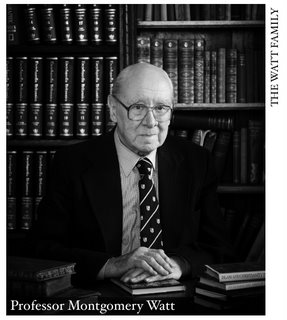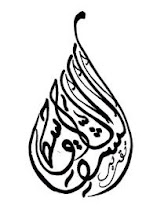OBITUARY | WILLIAM MONTGOMERY WATT
Charlotte Alfred
William Montgomery Watt - 14th March 19o9 - October 24th 2oo6
William Montgomery Watt - 14th March 19o9 - October 24th 2oo6
Leading Islamic scholar, whose remarkable legacy is encountered at the University of Edinburgh, and across the Muslim world.
Professor Watt became interested in Islam while lecturing in moral philosophy at the University of Edinburgh in the 193os. His mother had just died, and in order to pay for the housekeeper he invited an Indian Muslim to live as a paying guest in his house. Over breakfast and evening meals, passionate discussions between the two ignited his interest in Islam and the Arab world. This interest was to lead him all over the Muslim world, including working for the Bishop of Jerusalem from 1944 to 1946. His outstanding Islamic scholarship is world-renowned, and the University of Edinburgh was one of its major beneficiaries. Between 1947 and 1979 he worked in Islamic and Middle Eastern Studies, contributing to its development into one of the most highly regarded departments in its field. He has written over 3o books, and bestowed his exceptional personal collection of 1,4oo titles on the Edinburgh University library, covering Qur’ānic commentary, mysticism and Islamic law, the history of the Arab world, and Arabic literature.
 Professor Watt first came to Edinburgh to study Classics, and continued his studies in Philosophy and Ancient History at Oxford. He returned to Edinburgh to lecture in moral philosophy from 1934 until 1938, when he decided to complete a PhD on freewill and predestination in early Islam under Richard Bell, the pre-eminent Qur’ānic scholar and Reader of Arabic at the University. His interest led him to Palestine, where he worked for the Bishop of Jerusalem from 1944 to 1946 as an Arabic specialist, on the topic of Muslim-Christian relations. He was frustrated by the lack of opportunities for intellectual exchange with Muslims at that time in Jerusalem and, when he lost a friend in the bombing of the King David Hotel, he decided to return to Edinburgh. From lecturer in Ancient Philosophy from 1946-1947, he became Lecturer, Senior Lecturer and then Reader in Arabic from 1947-1964. In 1964, he was offered the personal Chair of the department, at that time named the Muir Institute, and oversaw its development into a centre of excellence for the study of the Muslim world. The departments of Arabic, Turkish and Persian were amalgamated into the Department of Islamic and Middle-Eastern Studies. His leadership and academic renown played no small part in the development of this centre of learning at the university. The department professes that “Edinburgh's present international reputation in the field of Islamic Studies is inseparable from the name of William Montgomery Watt.” He retired in 1979, but continued to publish titles into the late 199os.
Professor Watt first came to Edinburgh to study Classics, and continued his studies in Philosophy and Ancient History at Oxford. He returned to Edinburgh to lecture in moral philosophy from 1934 until 1938, when he decided to complete a PhD on freewill and predestination in early Islam under Richard Bell, the pre-eminent Qur’ānic scholar and Reader of Arabic at the University. His interest led him to Palestine, where he worked for the Bishop of Jerusalem from 1944 to 1946 as an Arabic specialist, on the topic of Muslim-Christian relations. He was frustrated by the lack of opportunities for intellectual exchange with Muslims at that time in Jerusalem and, when he lost a friend in the bombing of the King David Hotel, he decided to return to Edinburgh. From lecturer in Ancient Philosophy from 1946-1947, he became Lecturer, Senior Lecturer and then Reader in Arabic from 1947-1964. In 1964, he was offered the personal Chair of the department, at that time named the Muir Institute, and oversaw its development into a centre of excellence for the study of the Muslim world. The departments of Arabic, Turkish and Persian were amalgamated into the Department of Islamic and Middle-Eastern Studies. His leadership and academic renown played no small part in the development of this centre of learning at the university. The department professes that “Edinburgh's present international reputation in the field of Islamic Studies is inseparable from the name of William Montgomery Watt.” He retired in 1979, but continued to publish titles into the late 199os.
Professor Watt was highly regarded throughout the academic world. He held visiting professorships at the University of Toronto, the Collège de France, Paris, and Georgetown University and was awarded an honorary Doctorate by the University of Aberdeen. He was also ordained into the Scottish Episcopalian Church in 1939 and became a member of the ecumenical community of Iona in 196o. The community’s focus on ecumenism, as well as peace and justice issues, accord with his view that “the Christian aim for the foreseeable future should be to bring the religions together in friendly dialogue and, where possible, in cooperation, for there is a sense in which all are threatened by the rising tide of secularism and materialism”.
His views on Islam and Christianity have at times been controversial. He rejects the infallibility of both the Bible and the Qur’ān, but regards each as divinely inspired. He has argued that the Muslim and Judaeo-Christian traditions have much to teach each other, personally commenting that his study of Islam deepened his understanding of the oneness of God. He has written extensively on Islamic politics, history and the role of women in Islam, amongst other topics. His works include Muhammad: Prophet and Statesman (1961), Muslim-Christian Encounters: Perceptions and Misconceptions (1991) and Muslim Intellectual: a study of al-Ghazali (1963). Professor Carole Hillenbrand, the current head of the Department of Islamic and Middle Eastern Studies, attests to his remarkable legacy: “Professor Watt was probably the foremost Western scholar on Islam in the twentieth century and he always sought to build bridges between Christianity and Islam”.
He died, at the age of 97, at his home in Dalkeith, survived by his wife Jean, their children, grandchildren and great-grand children.
CHARLOTTE ALFRED is a student Religious Studies and Philosophy at the University of Edinburgh, and specialises in Islam. She has lived in Cairo and speaks Arabic.
Professor Watt became interested in Islam while lecturing in moral philosophy at the University of Edinburgh in the 193os. His mother had just died, and in order to pay for the housekeeper he invited an Indian Muslim to live as a paying guest in his house. Over breakfast and evening meals, passionate discussions between the two ignited his interest in Islam and the Arab world. This interest was to lead him all over the Muslim world, including working for the Bishop of Jerusalem from 1944 to 1946. His outstanding Islamic scholarship is world-renowned, and the University of Edinburgh was one of its major beneficiaries. Between 1947 and 1979 he worked in Islamic and Middle Eastern Studies, contributing to its development into one of the most highly regarded departments in its field. He has written over 3o books, and bestowed his exceptional personal collection of 1,4oo titles on the Edinburgh University library, covering Qur’ānic commentary, mysticism and Islamic law, the history of the Arab world, and Arabic literature.
 Professor Watt first came to Edinburgh to study Classics, and continued his studies in Philosophy and Ancient History at Oxford. He returned to Edinburgh to lecture in moral philosophy from 1934 until 1938, when he decided to complete a PhD on freewill and predestination in early Islam under Richard Bell, the pre-eminent Qur’ānic scholar and Reader of Arabic at the University. His interest led him to Palestine, where he worked for the Bishop of Jerusalem from 1944 to 1946 as an Arabic specialist, on the topic of Muslim-Christian relations. He was frustrated by the lack of opportunities for intellectual exchange with Muslims at that time in Jerusalem and, when he lost a friend in the bombing of the King David Hotel, he decided to return to Edinburgh. From lecturer in Ancient Philosophy from 1946-1947, he became Lecturer, Senior Lecturer and then Reader in Arabic from 1947-1964. In 1964, he was offered the personal Chair of the department, at that time named the Muir Institute, and oversaw its development into a centre of excellence for the study of the Muslim world. The departments of Arabic, Turkish and Persian were amalgamated into the Department of Islamic and Middle-Eastern Studies. His leadership and academic renown played no small part in the development of this centre of learning at the university. The department professes that “Edinburgh's present international reputation in the field of Islamic Studies is inseparable from the name of William Montgomery Watt.” He retired in 1979, but continued to publish titles into the late 199os.
Professor Watt first came to Edinburgh to study Classics, and continued his studies in Philosophy and Ancient History at Oxford. He returned to Edinburgh to lecture in moral philosophy from 1934 until 1938, when he decided to complete a PhD on freewill and predestination in early Islam under Richard Bell, the pre-eminent Qur’ānic scholar and Reader of Arabic at the University. His interest led him to Palestine, where he worked for the Bishop of Jerusalem from 1944 to 1946 as an Arabic specialist, on the topic of Muslim-Christian relations. He was frustrated by the lack of opportunities for intellectual exchange with Muslims at that time in Jerusalem and, when he lost a friend in the bombing of the King David Hotel, he decided to return to Edinburgh. From lecturer in Ancient Philosophy from 1946-1947, he became Lecturer, Senior Lecturer and then Reader in Arabic from 1947-1964. In 1964, he was offered the personal Chair of the department, at that time named the Muir Institute, and oversaw its development into a centre of excellence for the study of the Muslim world. The departments of Arabic, Turkish and Persian were amalgamated into the Department of Islamic and Middle-Eastern Studies. His leadership and academic renown played no small part in the development of this centre of learning at the university. The department professes that “Edinburgh's present international reputation in the field of Islamic Studies is inseparable from the name of William Montgomery Watt.” He retired in 1979, but continued to publish titles into the late 199os.Professor Watt was highly regarded throughout the academic world. He held visiting professorships at the University of Toronto, the Collège de France, Paris, and Georgetown University and was awarded an honorary Doctorate by the University of Aberdeen. He was also ordained into the Scottish Episcopalian Church in 1939 and became a member of the ecumenical community of Iona in 196o. The community’s focus on ecumenism, as well as peace and justice issues, accord with his view that “the Christian aim for the foreseeable future should be to bring the religions together in friendly dialogue and, where possible, in cooperation, for there is a sense in which all are threatened by the rising tide of secularism and materialism”.
His views on Islam and Christianity have at times been controversial. He rejects the infallibility of both the Bible and the Qur’ān, but regards each as divinely inspired. He has argued that the Muslim and Judaeo-Christian traditions have much to teach each other, personally commenting that his study of Islam deepened his understanding of the oneness of God. He has written extensively on Islamic politics, history and the role of women in Islam, amongst other topics. His works include Muhammad: Prophet and Statesman (1961), Muslim-Christian Encounters: Perceptions and Misconceptions (1991) and Muslim Intellectual: a study of al-Ghazali (1963). Professor Carole Hillenbrand, the current head of the Department of Islamic and Middle Eastern Studies, attests to his remarkable legacy: “Professor Watt was probably the foremost Western scholar on Islam in the twentieth century and he always sought to build bridges between Christianity and Islam”.
He died, at the age of 97, at his home in Dalkeith, survived by his wife Jean, their children, grandchildren and great-grand children.


0 Comments:
Post a Comment
<< Home